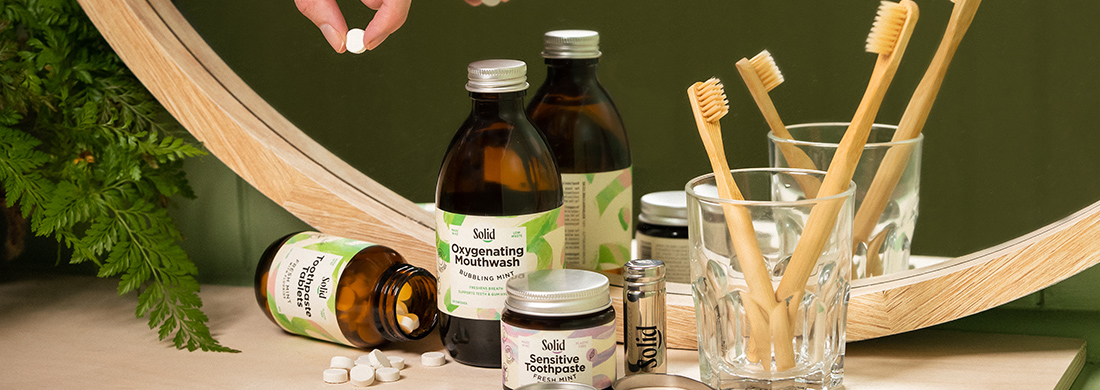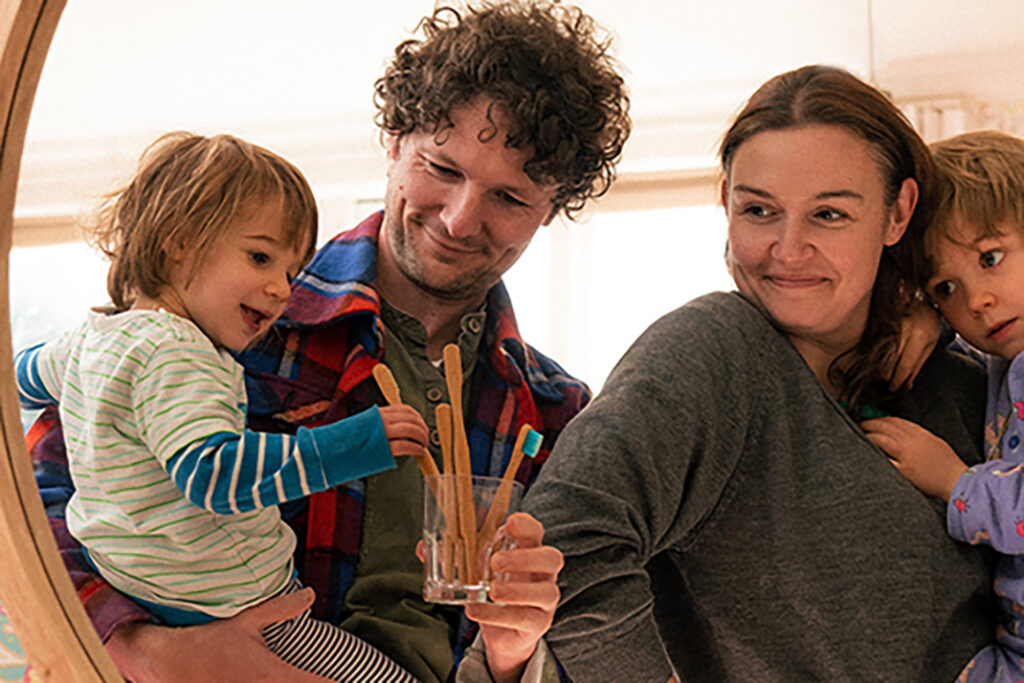
Glass heroes: Solid start to reducing toothpaste packaging

Solid is a classic example of Kiwi cottage industry and out the box thinking, with the company offering toothpaste through a reuse programme as well as refill options, among other products. The approach is proving successful, with Solid going from strength to strength in just three years.
The Glass Packaging Forum (GPF) awarded Solid a grant to help get their reuse programme up and running. We chatted to co-founder Adam McConnochie about how they got started, why reuse and refill, and where to next.
Solid isn’t your average oral care company, tell us about how it all began.
We’re is about three years old now. My wife Laura (Nixon) is the CEO and the brains behind Solid. She is a dental hygienist/dental therapist and is very passionate about supporting people’s oral health. She spent most of her time doing dental therapy, so working with children. She loved the job, but it was just plastic on plastic on plastic – lots of single-use plastic.
She obviously understands the logic behind that infection control side of things, but she became overwhelmed by how much plastic is used. So, she started tinkering – she’s very much of a problem solver, a creative – so she started experimenting with mouthwash and then toothpaste tablets and powder.
Where do you fit in?
My background is supporting entrepreneurs. I spent a decade at Asia New Zealand Foundation Te Whītau Tūhono running the business, entrepreneurship and leadership teams. I really loved building networks and connections between Kiwi entrepreneurs and those in Asia.
When Laura started Solid it was handy that I knew some of the systems and who to talk to for support. New Zealand is actually really lucky with a lot of good support networks for entrepreneurs.
About nine months ago I decided to go full time on Solid and support Laura wherever I can.
Solid has experienced some great growth recently. Tell us about that.
In mid-2020 we moved to Tītahi Bay in Porirua, bought a two-storey house and converted a section of the bottom storey into our toothpaste lab. Over the next two years the business really grew and took over the whole bottom floor of the house.
We then had no space to store our ingredients, so we hired a shipping container and put it on our front lawn – we were bursting at the seams.
So, at the start of this year we ran a crowd funding campaign which raised enough for us get into a proper factory. We actually just moved in at the start of May. It’s a shared space so as we grow, we can rent more of the building.
Was reuse and refill always the plan?
The motivation wasn’t to simply get away from plastic or just do refill or reuse. For Laura it’s always about the best way to do something.
When we decided to use glass, it was because we thought it was the best alternative to single-use plastic. It’s a great material, but if we can get the containers back and use them again then the carbon impact is greater, so we had to have a reuse programme.
We have had a lot of people tell us that plastic can be better for things like export, but we prefer to avoid using it if we can. It’s especially difficult to recycle plastic toothpaste tubes in Aotearoa because they have different component parts and need to be sent overseas to be recycled.
How did the grant from the GPF help with your reuse project?
It was really early days for us when we got the grant. It definitely helped get the programme running, but more than anything it was that validation that the GPF gave us by supporting what we were doing.
What do you think will help shift us away from single-use?
There is no silver bullet – there are many different components. Legislation is a part of it, along with other aspects.
For us it’s about focussing on what we can do and communicating what we are doing.
One of the ways we can make this impact is talking to the customers about what we are doing. The purpose of measuring our jar returns, which is at 15%, is to set that benchmark for improvement and engage with our customers more.
It’s really important that, as a business, we keep reminding ourselves it’s our customers who are bringing the jars back or using our refill stations, it’s not something that Solid is doing. It’s really obvious, but it’s important we recognise it’s our customers who are doing something good.
When we can communicate that impact, and show the numbers, it snowballs because people can see it’s working. Fifteen percent is great, but we want it to be even better. When people can see this isn’t a marketing gimmick or something happening on the side it creates more momentum.
We are really pleased that 45 of our 80 stockists are supporting toothpaste jar return through their outlets and 15% of the jars are coming back. We’re also really happy 14 stores do refill and, overall, we’ve saved 50,000 tubes of toothpaste going to landfill.
We obviously want to keep improving on those numbers. They are small numbers but it’s a good start and if you don’t talk about them now then people aren’t going to get on board.
Solid seems to have philosophy which goes far beyond just being a successful business?
A little toothpaste company in New Zealand isn’t going to solve climate change, but what we contribute is getting people thinking differently about what we produce and consume every day. I think that’s our main contribution.
Our position is really about everyone taking responsibility. When we say everyone, we mean businesses like us, and consumers, thinking about what they can do to have a positive impact.
What does the future hold for Solid?
Apart from our reuse programme we also have 14 refill stations at stockists for our toothpaste tablets and powder, and that’s the next step for us – eliminating the need for us to package the products entirely. The really exciting thing for us is Laura invented a toothpaste dispensing machine, by converting an old sausage making machine she found at my parent’s house.
We now have four stockists where you can dispense toothpaste. Good Housekeeping in Cuba Street in Wellington has been really supportive as we tested it out. They’ve had a toothpaste dispensing machine for about a year, which has gone really well.
They used to be one of our best jar return shops, but now they don’t return as many because they have converted their customers to refill and don’t sell many jars. It’s really about having that ‘best and better model’ where returning your jar is better but refilling your own container is best.
The vision for us is that our network of eco stores only do refill and supermarkets do jar return. You aren’t going to have 90% of New Zealanders doing refill toothpaste soon, it’s going to be a process.


